News
May 24, 2023
Rice volleyball to take its game to Brazil this summer
Volpe hopes trip will provide unforgettable experiences, spark new leadership roles

The Rice volleyball team will be taking a 10-day excursion to Brazil June 1-11, with plans to visit and compete in four cities.
The second international trip in the program’s history will include stops at São Paulo, Rio De Janeiro, Saquarema and Arraial Do Cabo. The Owls will play matches against Brazilian under-19 and under-21 teams, looking to hone their skills against international competition while also developing camaraderie that could pay dividends next season, their first in the American Athletic Conference.
“I’m really hoping that it provides our newcomers with the opportunity of learning our system and developing that team chemistry because that’s a huge part of the game of volleyball, just interacting with teammates in a positive way,” said head coach Genny Volpe, who took her team to Italy in 2019 . “More importantly, we lost some key seniors from last year, and what I really would love to see is some players stepping into new roles as leaders.”
The trip will also provide Volpe’s squad with increased training opportunities, as the team is able to practice for an extra 10 days prior to the trip that typically wouldn’t be allowed during the summer. Volpe said that along with the unpredictability of an international trip could be good for her team’s mental toughness.
“They’re so used to a structured environment where there’s an itinerary of where we’re going to be every second of the day,” she said. “But when you go on these tours, there’s just a lot of different things that are thrown at you, and the schedule gets kind of hectic, so it really does kind of show the players that it’s a mental game and you can deal with a lot of different things.
“And of course, there’s also the amazing cultural experience that they get, to be able to take a trip that they’ll likely never get to take on their own. It’s an awesome opportunity to get the team together to get to know each other a little bit.”
There will also be community service opportunities, including a trip to a local school to put on a volleyball clinic for children.
“I am most excited about my team and I competing together,” senior Sahara Maruska said. “I know that our team has a strong bond and it’s only getting stronger with each practice. I’m excited to see how we will overcome navigating a new country and meet new competition while also creating memories that will last a lifetime.”
Entering her 20th season as head coach at Rice, Volpe has established the program as a power. Under her watch, the Owls have been to seven NCAA Tournaments — the only seven appearances in Rice’s history.
She’s hopeful the Brazil trip can provide her team with an extra edge and level of togetherness that could help it take the next step in the upcoming season.
“For us, it’s always about maximizing our potential and continuing to stretch the envelope and trying to see how far we can go, and we know what it takes,” she said. “We’ve been to the NCAA Tournament, and we’ve made it to the second round. So, the next step for us is trying to get to that Sweet 16.
“Maintaining that level of success is hard enough. So with all these seniors leaving and new players coming in, and younger players learning, ‘hey, I’ve got a bigger role this year, and I’m going to own it,’ that’s what I’m most excited to see.”
March 8 – 9, 2023
Rice University Welcomes Brazilian University Presidents, Provosts & University Leadership
Association of Brazilian University Presidents (ABRUC), U.S. Embassy in Brasilia and
Fulbright Brasil
March 6, 2023
Brasil@Rice program celebrates a decade of international connections
In the fall of 2022, Arlei Silva, assistant professor of computer science, was thrilled to have been named a recipient of one of the prestigious “100,000 Strong In The Americas” research grants , awarded to projects that involve collaboration between universities in the United States and those in Central and South America.
Rice’s second “100,000 Strong In The Americas”-funded project since an engineering exchange program with Brazilian partners launched in 2017 , Silva’s proposal will see Rice collaborate with Serviço Nacional de Aprendizagem Industrial and Instituto Federal de Educação, Ciência e Tecnologia do Ceará in Brazil on academic and research programs to use artificial intelligence to address challenges such as flooding caused by natural disasters.

It was an exciting development for the Brazilian-born computer scientist, one he said wouldn’t have been possible were it not for his co-collaborator James Doss-Gollin , assistant professor of civil and environmental engineering, and for the professional guidance and resources made available to him through the Brasil@Rice program.
“I’m just an assistant professor trying to pull together this collaboration, so it helps so much that Rice already had this program put together,” Silva said. “I found that the community here was very close compared to other schools where I have been, where there were Brazilian students and faculty, but there weren’t really many initiatives where we could meet and work on programs like this.”
In 2022 — the same year Brazil itself celebrated its 200th birthday — Rice’s thriving Brasil@Rice program celebrated 10 years of fostering connections between the university and Brazilian students, scholars and educational institutions, as well as advancing partnerships among government and private sector entities in each country.
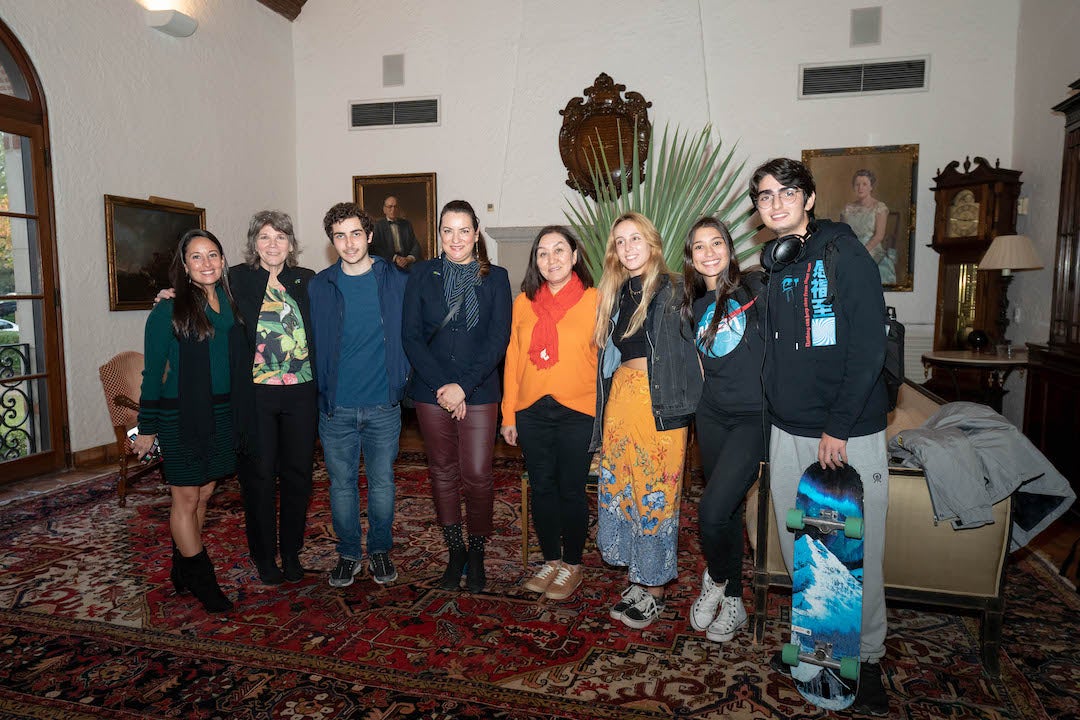 Brasil@Rice — whose name uses the traditional Portuguese spelling — was spearheaded by the Office of International Students & Scholars (OISS) and over the years has grown into a thriving point of pride for Rice. The program officially launched in 2012 with the support of former Provost George McClendon and then-recently hired José Onuchic, a pioneering Brazilian biophysicist, chemist and the Harry C. and Olga K. Wiess Chair of Physics whose wife Mayra Onuchic was Brasil@Rice’s first program administrator and ran the program for much of its existence.
Brasil@Rice — whose name uses the traditional Portuguese spelling — was spearheaded by the Office of International Students & Scholars (OISS) and over the years has grown into a thriving point of pride for Rice. The program officially launched in 2012 with the support of former Provost George McClendon and then-recently hired José Onuchic, a pioneering Brazilian biophysicist, chemist and the Harry C. and Olga K. Wiess Chair of Physics whose wife Mayra Onuchic was Brasil@Rice’s first program administrator and ran the program for much of its existence.
“It’s a great program, and it’s been a great incubator of these collaborations,” José Onuchic said. “We have had collaborations with many universities from all over Brazil and things just keep increasing.”
Many major collaborations happened during that period. Onuchic and McLendon established a partnership with the University of São Paulo that culminated with the joint Blue Gene supercomputer project between the universities. This multimillion-dollar collaboration changed the computational landscape for both universities and established a permanent, long-term collaboration between the institutions. Rice also became a direct partner with the Brazilian funding agency CNPq , which helped bring many Brazilian students and researchers to Rice in years to follow.
Thanks to these efforts during the program’s early days, Brasil@Rice blossomed from a passion project into a large interdisciplinary endeavor touching virtually every academic school and corner of campus.
“Watching the Rice community respond when they have the opportunity to embrace the excellence of Brazilian students, researchers and universities firsthand has been so rewarding,” said Adria Baker, OISS executive director and associate vice provost for international education. “They discover Brazil’s vibrant culture and experience just how dedicated, hard-working, warm and fun the Brazilian people are, and watching the Brazilian population thrive at Rice has been a delight as well.”
It’s undeniable that Brasil@Rice has had a significant impact on the university, opening up a plethora of educational opportunities for students and faculty from both Rice and Brazilian institutions as well as creating a warm, welcoming campus environment that helps facilitate all sorts of cross-cultural exchanges.
Across the program’s 10-year history, Rice each year has welcomed an average of 30 Brazilian students and 35 Brazilian professors, postdoctoral researchers or other professional scholars inside the hedges. In fall 2022 alone, Rice hosted 48 Brazilian scholars, 23 graduate students and 11 undergraduate students. The program has fostered connections with 25 Brazilian universities and 100 Brazilian academics that have led to collaborations with over 25 academic departments across Rice and approximately $250,000 in grant funding for research and other educational endeavors.
Thanks in part to the support of Brasil@Rice, the Brazilian Student Association (BRASA) in 2019 won Rice’s prize for graduate organization of the year. And in 2020, the Institute of International Education awarded Brasil@Rice one of its heralded Andrew Heiskell Awards for innovation in international education.
Brasil@Rice hasn’t just limited itself to building collaborations within classrooms and laboratories; the program has provided resources for a whole array of events, networking opportunities, connections and cultural-exchange lunches and dinners that have played a pivotal role in making Rice a welcoming environment for Brazilian students and scholars. Brasil@Rice has also made it possible for Rice faculty to visit partner institutions in Brazil and has hosted numerous delegations of prominent Brazilian officials on campus, including Brazil’s Minister of Science, Technology and Innovation Marcos Pontes and senator Rogério Carvalho.
Fabiana Santos, current Brasil@Rice program administrator and a magister of Wiess College, considers the talent and enthusiasm of Rice’s Brazilian student population coupled with Rice’s commitment to fostering a sense of international diversity and community among the key reasons why the program has thrived for all these years.
“Students come from the very best Brazilian universities, and bring knowledge but also the desire to succeed, along with a nice dose of a sense of community and cheerfulness,” Santos said. “The fact that these great students succeed at Rice, I believe, is because of the effort that Rice University has made to build and nurture close and warm relationships with the students, and to maintain great connections with Brazilian universities.
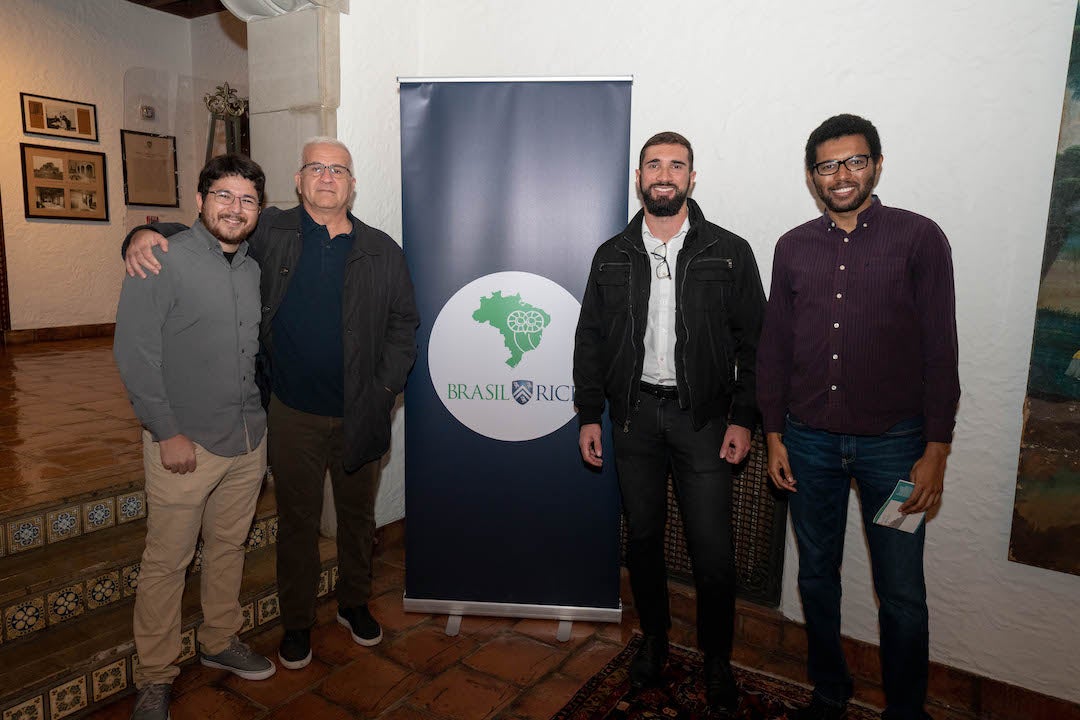
“It doesn’t matter how long a Brazilian has lived abroad — the offer of pao de queijo (Brazilian cheese bread), coffee and ‘bate papo’ (Portuguese lingo for friendly conversation) will always make them drop everything, congregate around a table to share these simple pleasures, make friends and talk,” Santos said, explaining her team’s understanding of how important intentional community-building is to keeping Brasil@Rice a vibrant force on campus in the years ahead. “Our goal and our desire for the office is to attract more brilliant minds, continue long-term relationships with key university partners for research and exchange, and, at the same time, keep a personal touch.”Santos, Baker and their Brasil@Rice partners across campus have plenty to be excited about in the weeks and months ahead — in addition to Silva’s 100,000 Strong disaster-preparedness project beginning to ramp up and take shape, Rice, with President Reginald DesRoches as lead, will play host March 9 to a delegation of Brazilian university presidents, provosts and other higher education leaders who are affiliated with the Association of Brazilian University Presidents, the U.S. Embassy in Brazil and Fulbright Brazil.
When asked about the many ways Brasil@Rice has contributed to Rice since its inception, Silva immediately thinks of how thanks to the program, the experience of a Brazilian graduate student he recently recruited to his lab will be vastly different from his own experience as a graduate student, leaving his family and home country to pursue his dreams in the United States.
“I immediately told him to reach out to the Brazilian students here at Rice, who made his transition much easier than my transition when I came to the U.S. to do my Ph.D.,” Silva said. “He’s already getting involved with Brasil@Rice and going to their events and cultural programs.
“It’s a whole ecosystem of people trying to help each other,” he said.
Feb. 27, 2023
Rice and Brazil teams tap AI to address flooding, other climate crises
CS and CEE professors receive grant for infrastructure research with colleagues in Brazil
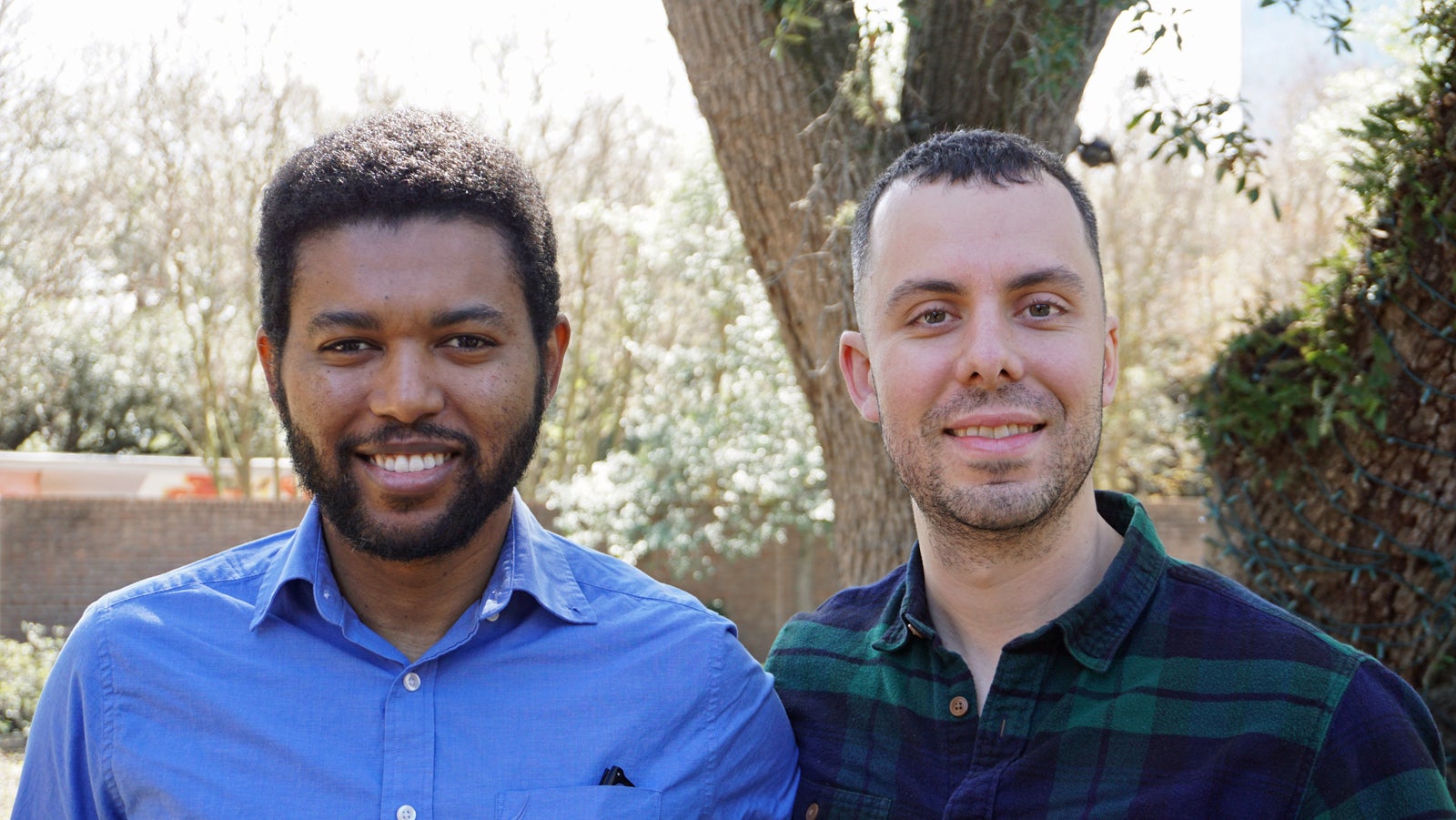
Photo: Rice University Computer Science and Civil and Environmental Engineering faculty members Arlei Silva and James Doss-Gollin lead new U.S.-Brazil collaboration.
Rice University engineering students and their peers in two Brazilian universities are researching computational methods to address flooding and other climate-related crises, thanks to funding from the 100,000 Strong in the Americas initiative.
Led by assistant professors Arlei Silva in Computer Science and James Doss-Gollin in Civil and Environmental Engineering, the program integrates research and development, education, and local partnerships to improve infrastructure systems to better handle hydroclimate extremes.
“Like Houstonians, I grew up understanding the impact of extreme hydroclimate surges on our local roads, power, water, and other infrastructures in southern Brazil. As a Ph.D. student and postdoc in California, I became interested in the use of data to help solve climate challenges, particularly in regard to the infrastructure that is so necessary in times of disaster. When I was interviewing for a faculty role at Rice, that slide caught a lot of attention,” said Silva.
“One of the faculty members in the audience talked about Hurricane Rita and gave me examples of infrastructure and disaster preparedness, saying how relevant my interest was for Houston. He said, ‘Rice wants to play a local role and solve problems that we really care about here in Houston.’ That led to my collaboration with James, and ironically tied back to my own roots in Brazil. Climate change and weather-related disasters are a universal challenge right now, so the 100,000 Strong funding we received can help research teams in Brazil and Houston learn how to apply artificial intelligence (AI) methods in improving urban sustainability and resilience in natural disasters.”
Adapting existing behaviors, infrastructure, and resources to address the issues that arise with evolving climate change is of particular interest to Doss-Gollin. His research training is at the intersection of hydroclimate science, statistical and machine learning methods, and decision analysis — which he said helps him better understand specific AI methods and how they can be applied to solve critical adaption challenges.
He said, “Quantifying the risks of hydroclimate extremes in a changing climate involves weaving together three separate threads: (1) exploring a large number of possible climate futures, (2) representing the impact of each at the scale of rivers, buildings, and infrastructure systems, and (3) quantifying how these impacts affect vulnerable communities and ecosystems.
“Identifying promising strategies for mitigating these risks requires repeating this analysis for each strategy considered. Yet linking models that represent global-scale processes (e.g., global climate and weather patterns) to decision-relevant local variables (e.g., where flooding occurs in a city) remains a challenge. Physics-informed AI offers an opportunity to reduce the computational burden of these models while increasing their explainability.”
While Doss-Gollin and Silva were exploring their own research opportunities, Adria Baker in the Office of International Students and Scholars (OISS) learned of a new funding competition linking climate research with undergraduate research to be shared by universities in Brazil and the United States.
Baker, the Executive Director for the OISS and Rice’s Associate Vice Provost for International Education, has served on review panels for previous 100K Strong funding competitions. She had been impressed with the manner in which the foundation places strong value on follow-up assessment, multiplier-effect, binational mobility, and distinctive academic and global learning.
“I have known about the great impact this program has had through the years between U.S. universities and colleges and those throughout Latin America,” said Baker. “Many students who would never have conceived that they would be able to study or conduct research abroad, have the opportunity through the 100,000 Strong in the Americas. Their lives have been beautifully enhanced forever.”
Baker reached out to Silva, Marjorie Cerejo Esch — an OISS international delegate and compliance specialist who grew up in Brazil — and Fabiana Santos of Brasil@Rice to gauge interest in the funding proposal. Silva was willing to work up a proposal but did not have a contact at SENAI, a primary collaborator in the funding competition. Esch agreed to help identify potential faculty partners in SENAI and other institutions in northwest Brazil while Silva and Doss-Gollin began outlining a program that could provide undergraduate student research opportunities at Rice and connect their students with similar research teams in Brazil.
Silva said, “Marjorie helped us connect with Jose Wally Mendonça Menezes and Francisco Gutenberg Albuquerque Filho at Instituto Federal de Educação, Ciência e Tecnologia do Ceará (IFCE). Everyone was excited by the opportunity to further our research while providing an exchange of ideas and projects between our students and institutions.
“Our proposal was selected for funding and we began working toward our goal: to train a new generation of students in Brazil and the U.S. — in partnership with local stakeholders — to use artificial intelligence with infrastructure, climate, and urban data so we can address challenges caused by extreme weather.”
Silva’s area of interest is in the use of graphs to connect objects in complex systems. The models used to process large streams of infrastructure and climate-related data require more and more computing resources, but that demand can be streamlined by shifting to powerful models like graphs.
“That is how my original collaboration with James came about,” said Silva. “We were looking at modeling flooding in Houston and explored ways to better use computation to speed up that modeling. Could we use graphs as a way to do that?
“I really enjoy finding ways to apply tools from computer science to problems in different domains. It is very interesting to me to learn how people in that domain are approaching the problem, then look at it from a CS perspective. To that end, this new project is a great opportunity to get computer science students excited about solving climate and infrastructure problems.”
Silva used a selection process to find five Rice CS students interested in applying computational tools to climate-related infrastructure issues in Houston. In addition to the skills the students had previously acquired, they are now learning to use AI and other modeling tools to answer questions about sustainability and resilience to natural disasters in Houston and in the Americas.
“My expectation is that this collaboration between our students and those at SENAI and IFCE will lead to the development of new AI and big data software tools, which will then prompt innovations in technology as well as sectors like construction, engineering, and transportation infrastructure as we help develop designs for more resilient and sustainable infrastructure,” he said.
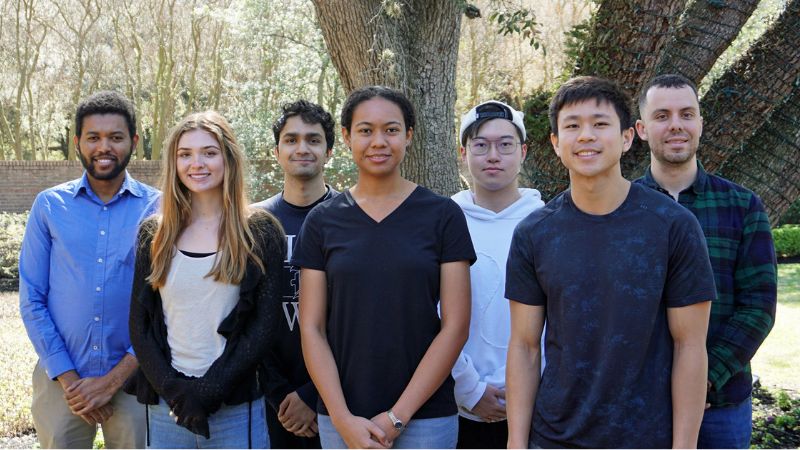
But Silva is also realistic about starting small. He said the first goal of the IFCE-Rice-SENAI program is to educate students about the research process. Undergraduate students may be more accustomed to projects with a finite closure, such as problems that can be solved by the end of a semester. Research does not adhere to that kind of timeline and Silva said their students’ first attempts will probably fail.
“These are very hard problems, but the faculty members at Rice, IFCE, and SENAI want our students to see that big problems are worth solving, worth the effort, worth the frustration of failing and trying again. Maybe they will even be inspired to pursue their research as a career effort, but primarily we want them to focus on solving real life problems as we help them learn and navigate the research process,” said Silva.
“Part of that learning is setting goals and evaluating progress and results the way researchers do. In the Rice students’ case, how accurate are our models? Can they predict major flooding events in Houston? If we’d had their ‘new’ modeling tools at the time of say, Hurricane Rita, could we have helped mitigate the damage?”
Doss-Gollin is pleased with the results of the Rice team thus far. He said, “We’ve turned a small team of undergraduate students loose on a set of interesting problems and provided them with some overview trainings and projects. Their enthusiasm for the material and the unique skill sets and experience that each brings to bear is inspiring. I’m excited to see what they can discover and solve in this first phase.
His status update makes Esch smile; when she agreed to assist with the early stages of the proposal, she anticipated great outcomes of the binational collaboration. She said, “This program provides an opportunity for students to learn about AI technologies and apply them to real-world problems related to urban sustainability and resilience.”
“It also allows institutions to access [each other’s] cutting-edge research and develop innovative solutions that could help them better prepare for natural disasters. This kind of collaboration is mutually beneficial as it helps both parties gain knowledge, skills, and resources that they wouldn’t have had access to otherwise.”
Doss-Gollin is proud of the way the program has brought together stakeholders with different timelines and pressures to develop shared curricula around urban resilience and AI. “This allows us to not only increase the quality and relevance of these materials, but also to make them accessible to problem-solvers around the world. Solving these challenging and important questions requires global collaboration, and based on this experience and my prior research collaborations in Brazil, I am thankful to learn from and share insights with our international colleagues,” he said.
Baker was confident the collaboration would be a success. She said, “Anytime you can engage students from the USA to travel to Brazil, or Brazilians to come to the USA, you are going to find that there are so many great things they can learn from each other – personally and academically,” she said.
“I believe the topics that the faculty members and collaborators are developing will be extremely beneficial to both countries. We all have so much to learn with this topic, and the student interactions with one another and the faculty members will be priceless.”
This type of collaboration is one of the reasons Silva was first drawn to Rice. He said, “Rice has a global perspective and is very intentional about connecting with other institutions as an international university — all over the world, but especially in South America. Rice is also known for its undergraduate research opportunities. Many top tier universities offer great courses and instructors, but the opportunity to engage in research outside the classroom, and to do so in an international collaboration is unusual. Except at Rice.”
Silva is also thankful for the support key members of the Rice community provided for this particular project. In addition to Baker’s endorsement, the proposal received letters of support from Lydia Kavraki, Angela Wilkins, Luay Nakhleh, and Phillip Bedient.
Bedient is the Herman Brown Professor of Engineering in the Department of Civil and Environmental Engineering and may be best known for his hydrology and flood prediction research in the SSPEED Center. Kavraki’s letter of support was linked to her role as the Director of the Ken Kennedy Institute, but she is also the Noah Harding Professor of Computer Science, professor of Bioengineering, professor of Electrical and Computer Engineering, and professor of Mechanical Engineering at Rice. Wilkins is the executive director of the Ken Kennedy Institute. Nakhleh is the William and Stephanie Sick Dean of the George R. Brown School of Engineering, but he is also the former chair of the Computer Science Department and remains a professor of CS and of BioSciences.
Silva said, “Next, we will organize a workshop here at Rice to bring together students from Rice, IFCE, and SENAI, community partners, and Rice researchers working at the intersection of AI, resilient infrastructure and sustainability. We are very thankful for all the support we have received for this project and are very excited about the impact it will have in all the institutions involved.”
September 21,2022
 Innovation Fund Announces New Partnerships and Training Programs between the United States with Brazil
Innovation Fund Announces New Partnerships and Training Programs between the United States with Brazil
Rice University’s Brazilian Professor Arlei Silva is the director of the program.
Rice University, Texas, USA
Instituto Federal de Educação, Ciência e Tecnologia do Ceará, Fortaleza, Brazil
Instituto SENAI de Inovação para Tecnologias da Informação e Comunicação, Recife, Brazil
IFCE-Rice-SENAI Program on Artificial Intelligence for
Urban Sustainability and Resilience to Natural Disasters in the Americas
This 100K Strong program integrates research and development and local partnerships to improve infrastructure systems to better handle hydroclimate extremes. The goal is to train a new generation of students in artificial intelligence for infrastructure, climate, and urban data to address challenges caused by extreme weather.
August 18, 2022

Modern Techniques could lead to discovery of therapies for AIDS and COVID
CELL PHYSICS: Brazilian José Nelson Onuchic, a professor at Rice University, in the United States, spoke about his studies that seek to understand how the structure of the cell nucleus controls the expression of genes.
“It’s not just about having good data or good models, but something in between. We are trying to bring the two together, to utilize the best of the exact sciences and the biological sciences,” he said.
March 29, 2022
March 21, 2022
Rice News: Brazilian science minister Pontes returns to Rice

March 10, 2022
Visiting Rice University
Marcus Pontes, Brazilian Minister of Science, Technology, Innovation, and Communications
The minister had several technical visits during his stay in the Houston area, including the Artemis project at NASA and the Port of Houston, but the only University visited was Rice University. The event marks a strong partnership aiming to promote research and academic exchanges between Brazil and Rice.

Feb. 21, 2022
Bringing Brazil to the Bayou City
Fullbright Delegation visits Rice University.
The four-day program was co-sponsored by the School of Engineering, Brasil@Rice and the Office of International Students & Scholars, who also invited the Consul General from Brazil and leadership from the Brazil-Texas Chamber of Commerce to participate in the workshops and other events.
Aided by its close relationship with the Brazilian consulate in Houston, Brasil@Rice has served as a model at Rice for advancing research and creating enduring, productive relationships since its founding 10 years ago.
Feb. 7, 2022
imagineRio allows users to visualize five centuries of change in a modern megacity
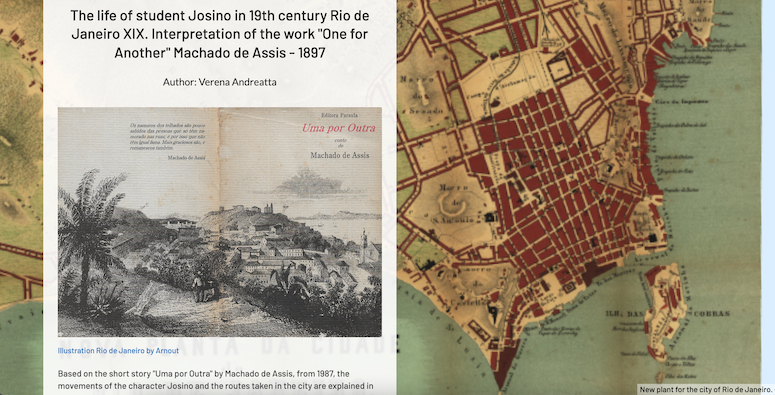
A screenshot of a story map created using imagineRio’s newly built narrative tool, available in English and Portuguese.
Biologists discover new insect species at Rice University
Jan. 24, 2022
https://news.rice.edu/news/2022/biologists-discover-new-insect-species-rice-university
Jan. 12, 2022
Dr. Domingues da Silva (History Department, CAAAS, SlaveVoyages Database, and Martel Magister) won a prestigious NEH grant for the following transnational research project:
NEH/AHRC New Directions for Digital Scholarship in Cultural Institutions
Project Director: Daniel Domingues da Silva
Project Title: Towards a Digital Archive of the Atlantic Slave Trades: Unlocking the Records of the South Sea Company
Project Description: The development of the Digital Archive of the Atlantic Slave Trades, an open-access resource that will digitize, transcribe, translate, and semantically link
manuscript materials documenting the South Sea Company and its contribution to the trans-Atlantic and intra-American slave trades. The UK partner is Lancaster University.
You can find more info here.
========================================================================
Rice News: Bem-vindo!
New Consul General of Brazil in Houston Maria Izabel Vieira received a warm welcome to the city and Rice from students, scholars, faculty and staff at the Cohen House Nov. 2. The Office of International Scholars and Students and Brasil@Rice hosted conversations with Vieira regarding Brazilian academic initiatives at the university.
https://news.rice.edu/news/2021/bem-vindo
========================================================================
Brazilian graduate student and BRASA president, Ivan Rosa, receives the “Graduate Teaching Award for Student Support”
GRADUATE TEACHING AWARDS
Developed by the CTE, Graduate Teaching Awards recognize graduate students who excelled at supporting undergraduate teaching at Rice as instructors of record and teaching assistants. Each year, four winners are selected by committees composed of CTE Graduate Liaisons, CTE Graduate Fellows and CTE Faculty Fellows in the following categories: Independent Instruction, Course Support and Student Support. The winners are selected based on their teaching philosophy, use of research-based methods and contribution to student learning. In order to apply for the Course Support award, graduate students have to be first nominated by a faculty instructor. Applicants for the Student Support award are asked to submit references from one undergraduate student.
========================================================================
Pope appoints expert in Molecular Biophysics at Pontifical Academy of Sciences
14 October 2020
José Nelson Onuchic, Professor of Physics and Astronomy and Chemistry at Rice University in Houston (USA), is appointed as an Ordinary Member of the Pontifical Academy of Sciences.
Pope Francis on Wednesday appointed Professor José Nelson Onuchic as a new member of the Pontifical Academy of Sciences, the Vatican’s international scientific academy, established by Pope Pius XI in 1936.
Curriculum vitae
Prof. José Nelson Onuchic was born on January 17, 1958, in São Paulo (Brazil), where he graduated in Electrical Engineering in 1980, in Physics in 1981 and in Applied Physics in 1982.
He completed his PhD in Chemistry at the California Institute of Technology (USA) in 1987. After a brief period of post-doctoral study in Santa Barbara, California, he taught at the University of São Paulo (Brazil) from 1987 to 1990, the year in which he returned to the United States, where he taught at the University of San Diego (California) until 2011. He then moved to Rice University in Houston, Texas, to teach Physics and Astronomy, Chemistry and Biosciences. Here he is co-director of the Centre for Theoretical Biological Physics.
He has received several awards for his studies, including the Beckman Young Investigator Award in 1992; he became a fellow of the American Physical Society in 1995 and was elected a member of the US National Academy of Sciences in 2006, and of the Brazilian Academy of Sciences in 2009.
His current research interests centre on theoretical and computational methods on the borderline between physics and biology, with their effects on human biology and genomics.
The Academy
The work of the Pontifical Academy of Sciences comprises six major areas: Fundamental Science, Science and technology of global problems, Science for the problems of the developing world, Scientific policy, Bioethics and Epistemology.
========================================================================
Graduate Student Organization of the Year: Brazilian Student Association (BRASA)!
Congratulations BRASA (Brazilian Student Association at Rice University) for the recognition received on the second annual Club Awards Reception.
The event was held virtually on April 16, 2020.
The Club Awards Reception, hosted by the Student Center, is an opportunity for the Rice community to recognize the contributions of dedicated student leaders, organizations and faculty/staff club sponsors.
About the award: The Graduate Student Organization of the Year award recognizes a registered graduate student organization that has advanced the mission of Rice University by cultivating a diverse community of learning and discovery that produces leaders across the spectrum of human endeavor. Through their contributions, the recipient of this award has enhanced the graduate student experience of their members and the student body at large. The recipient should exemplify Rice’s mission, while providing opportunities for others to become involved and grow as leaders.
========================================================================
Egresso do IFPI elabora site para monitorar COVID-19 no Brasil
March 23, 2020
O novo coronavírus vitimou pelo menos 1.604 pessoas e levou ao óbito 25 brasileiros, os dados são do último boletim divulgado pelo Ministério da Saúde neste domingo, 22. Para saber o número de casos por estado é possível acessar o site https://coronavirusnobrasil.org, criado por Bruno de Castro egresso do Instituto Federal do Piauí (IFPI), campus de Teresina Central.
Bruno de Castro nasceu no Pará e morou no estado até os 7 anos, quando me mudou para cidade de Água Branca no Piauí. O jovem sempre estudou em escolas públicas até ser aprovado no ENEM para o curso de Geoprocessamento do IFPI, em 2012.
Em 2014, o paraense teve a oportunidade de participar do programa Ciência Sem Fronteiras do Governo Federal. Que dava oportunidade aos estudantes, principalmente das Ciências Exatas, para estudar no exterior em diversos países pelo mundo.
“Eu fui aceito pela Rice University, Houston – TX e durante o meu ano acadêmico eu comecei um estágio com o professor Farès el-Dahdah. Eles estava criando um mapa diacrônico da cidade do Rio de Janeiro, o imagineRio.org, e precisava de alguém que entendesse de Sistemas de Informações e falasse português. Continuei nesse estágio até mesmo depois de retornar ao Brasil após o fim do programa, trabalhando remotamente. Em 2017, assim que me formei, fui convidado a voltar para a universidade como Pesquisador em Sistemas de Informações Geográficas”, explica Bruno Castro.
O site para monitorar os casos de coronavírus no seu país de origem surgiu após o Bruno observar mapas de COVID-19 que mostravam todos os países, mas não mostravam os estados do Brasil.
“Acreditei que as pessoas gostariam de uma ferramenta que compilasse os dados dos estados em um único local e decidi criar um mapa para poder mostrar essa informação. Meu chefe gostou e adquiriu o domínio “coronavirusnobrasil.org”, daí passamos a divulgar o site. O propósito do site é facilitar o acesso à informação sobre o COVID-19 no nosso país”, diz.
Para o jovem o cenário atual é de muita preocupação pois o número de casos que estão surgindo pode superlotar sistema público de saúde.
“Seguindo a proporção de aumentos de casos em outros países, o Brasil já está saindo na frente e o cenário pode se tornar pior que em outros países. Precisamos de distanciamento e isolamento social. Não mais sair às ruas sem necessidade. A ordem pelas próximas semanas, ou meses, é ficar em casa”, conclui.
========================================================================
Rice University/Brasil@Rice won the 2020 Andrew Heiskell Awards for Innovation
Since its founding in 2012, Brasil@Rice has served as a hub for meaningful connections between Brazil and the university. Brasil@Rice builds bridges in its communities by focusing on social activities as much as academic and professional partnerships. Many of its projects also draw upon multiple departments on Rice’s campus, giving Brasil@Rice the opportunity to promote interdisciplinary approaches and internationalization simultaneously. Aided by its close relationship with the Brazilian consulate in Houston, Brasil@Rice has served as a model at Rice for advancing research and creating enduring, productive relationships.
========================================================================
Undergraduate team wins nationals, qualifies for ‘World Cup’ of physics
December 16, 2019
Led by sophomore physics and mathematics major Matheus Barbosa, the team claimed by victory by a slim nine points. Members include freshmen Poom Kritpracha and Ayush Sachdeva, senior physics and computer science major Xinyun Liu and sophomore physics major Kevin Zheng.
Read more on: http://news.rice.edu/2019/12/16/undergraduate-team-wins-nationals-qualifies-for-world-cup-of-physics/















